Brief History of African Americans
- African Americans arrived in America in the colonial era to work in cane plantations as a result of slavery.
- They formed part of the lucrative trade in slave labor fuelled by slave raiding parties (Niles, 2010 ).
- Slave trade was rampant across the world, with Africa serving as one of the main catchment areas.
- After the abolishment of slave trade, and the subsequent abolishment of segregations laws, African Americans attained full citizenship in America.
- Their unique history since the era of slave trade continues to play a significant role in their lives today.
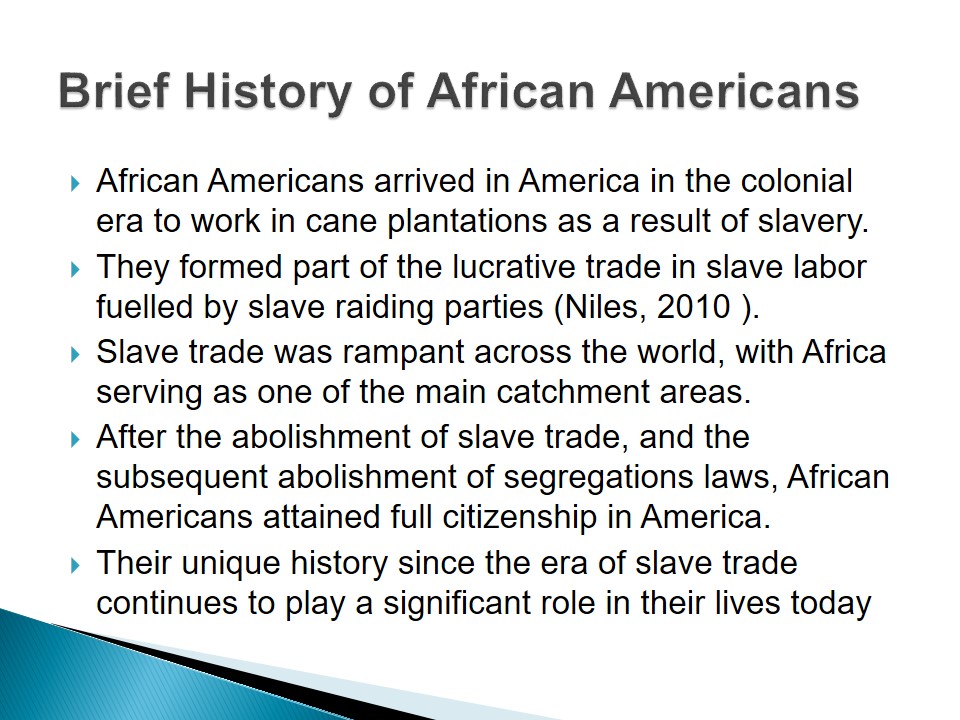
Values
- The value system of African Americans does not vary a lot from the general values espoused by other Americans.
- Most of their values emanate from their historical and cultural experience. African Americans are strong supporters of democratic ideals, personal freedoms, and the freedom of religion.
- Values emphasized by African Americans include:
- Strong communal ties derived from their African roots and their collective experience during slavery and during the years of segregation (Scott, 2005);
- Strong commitment to religion;
- Strong sense of personal and family pride that at times hinder them from seeking help (Jones, 2008).
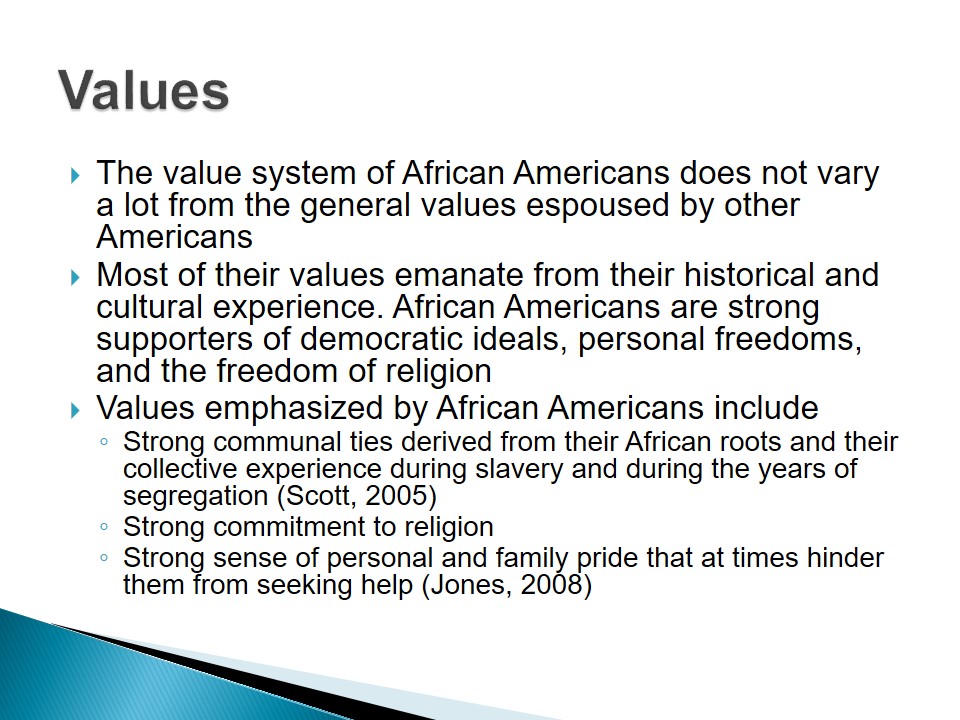
Language and Communication Patterns
- Language:
- African Americans no longer speak the native languages from their African heritage.
- Depending on specific social circumstances, some use a distinct form of slang (Laster, 2001).
- The more affluent African Americans tend to use the standard form of American English.
- Communication Patterns:
- The communication patterns of affluent African Americans does not vary in a notable way from the standard communication patterns.
- The less affluent African Americans tend to use street language most of the time.
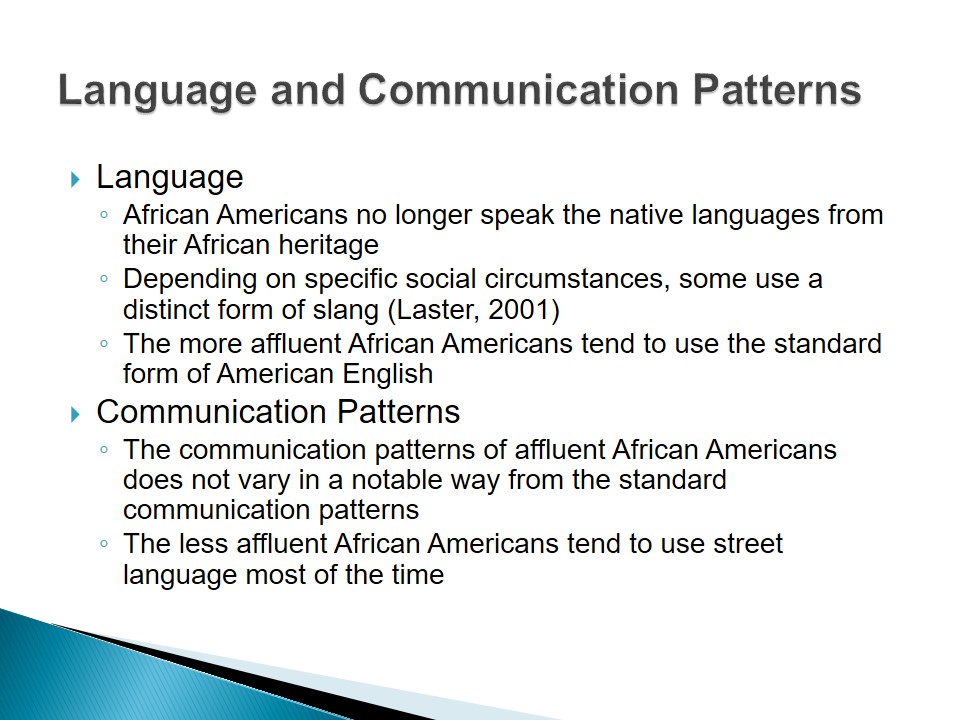
World View
- African Americans have a higher distrust for the government than most Americans (Jones, 2008).
- They also do not trust the criminal justice system and the mainstream media(Jones, 2008). This may be attributed to the high crime rate among African Americans.
- African Americans mainly view life as a struggle. This is a legacy of slave trade and segregation.
- African Americans believe that solidarity is necessary for their survival.
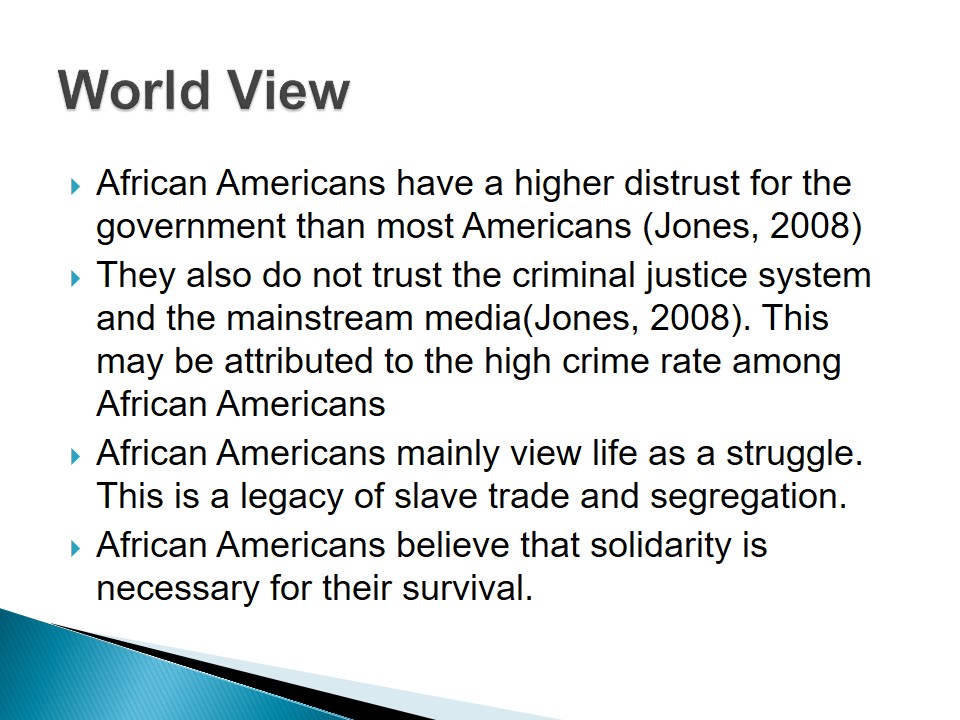
Arts and Expressive Forms
- Arts and expressive forms developed by African Americans have a strong correlation with the historical experiences of the community.
- The most recognizable form of African American art is hip hop music (Niles, 2010) This genre emanated from the need to have a means of expressing the frustrations of daily life that African Americans were experiencing.
- Other art forms developed by African Americans also carry the message of emancipation.
- Music and visual art (such as graffiti) continue to play a key role in the expression of African American views in the American society (Scott, 2005).
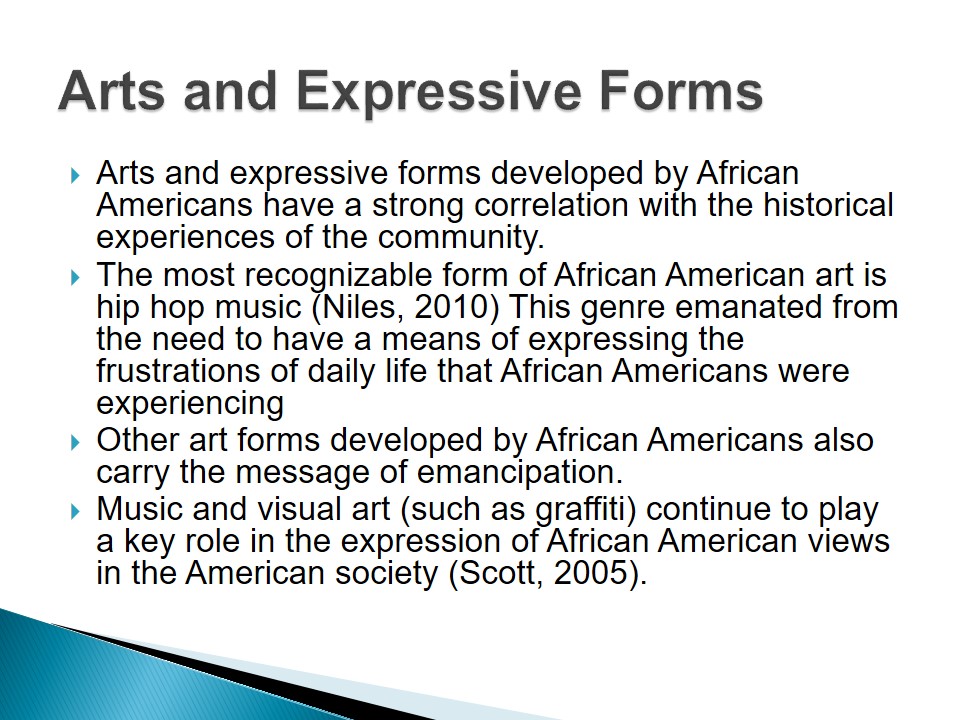
Norms and Rules
- The norms in African American lifestyle are similar to the norms of the American society in many ways. Societal phenomenon such as materialism affect them in similar ways.
- They also suffer from the same problems affecting Americans in general. For instance African Americans have high instances of obesity, which is comparable to other Americans.
- Specific norms that are pronounced among the African Americans include:
- A Strong sense of community;
- Organization of groups and families around clear power structures (Jones, 2008);
- Ability to integrate with other communities.
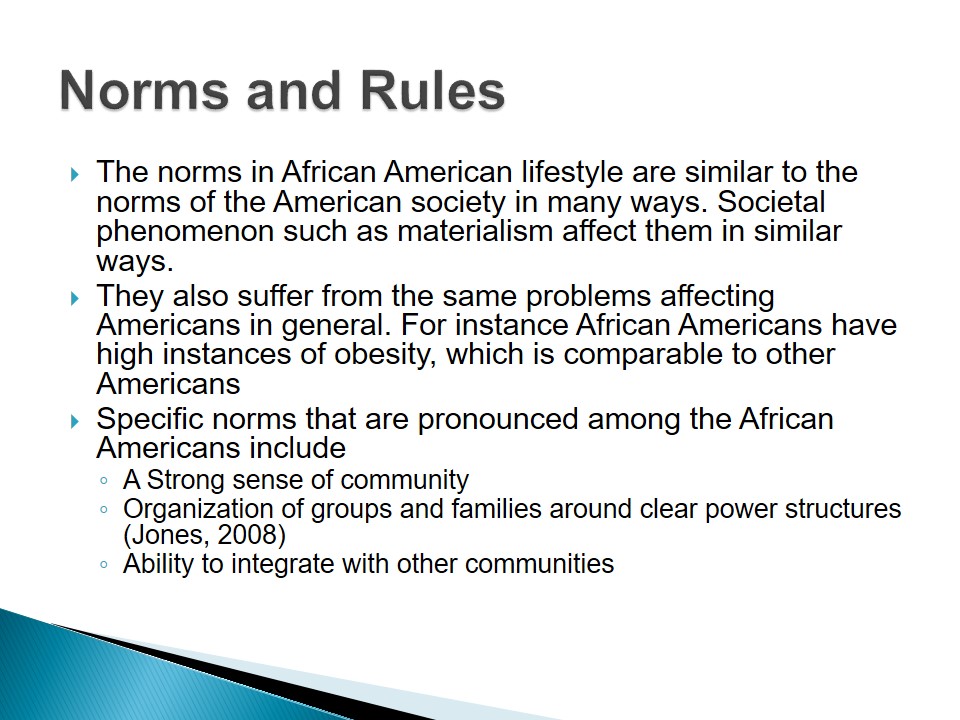
Lifestyle Characteristics
- The African American lifestyle revolves around the extended family unit.
- African Americans have managed to maintain the extended family structure partly as a means of survival.
- Since African American families tend to be less affluent in their communities, the sharing and competition for resources is normal.
- African Americans also have worse socio-economic indicators compared to most Americans. This includes:
- low unemployment rates;
- high crime rates;
- higher infant mortality;
- lower wellness levels;
- lower academic achievements (Ulmer, 2010).
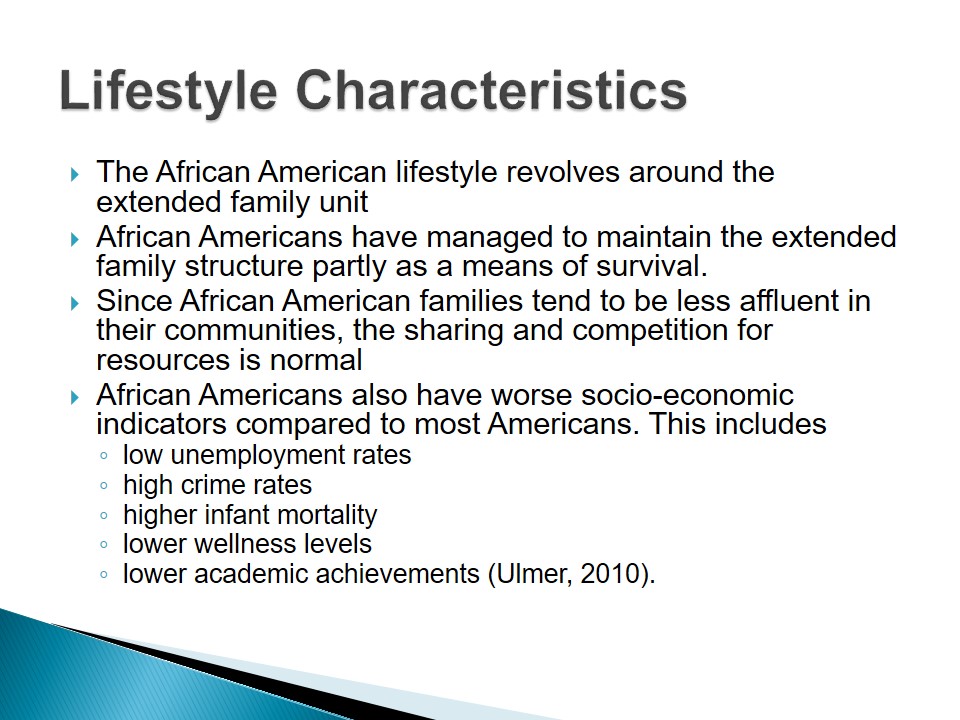
Relationship Patterns
- African Americans grow up in communal settings.
- Usually, African American families have members of the extended family living with them at any one time.
- Grandparents (especially grandmothers) play a vital role in holding extended families together (Jones, 2008).
- Many African American families are headed by women.
- There is also a higher incidence of single parent families among African Americans that the national rate.
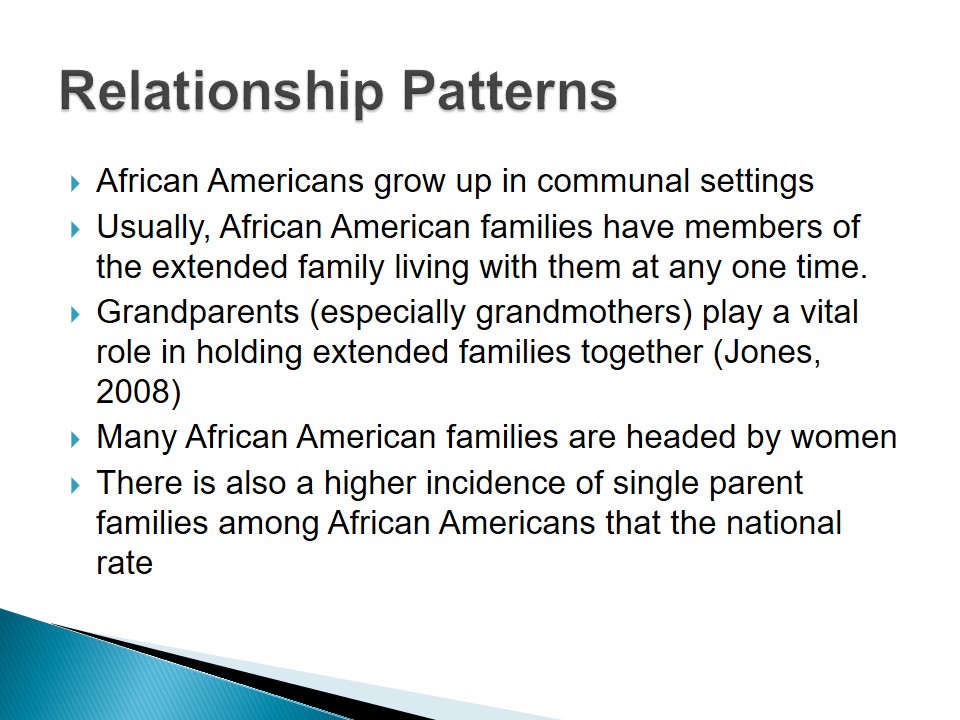
Degree of Assimilation
- African Americans tend to integrate into their host communities.
- This seems to be a form of adaptation they have learnt after centuries of slavery, servitude, and segregation.
- This does not mean that they lose their identity. It only means that they find a way to survive in their environment quickly and easily.
- African Americans also intermarry freely with other people groups. More than 50% of all African Americans today have at least one ancestor from a different racial descent (Ulmer, 2010).
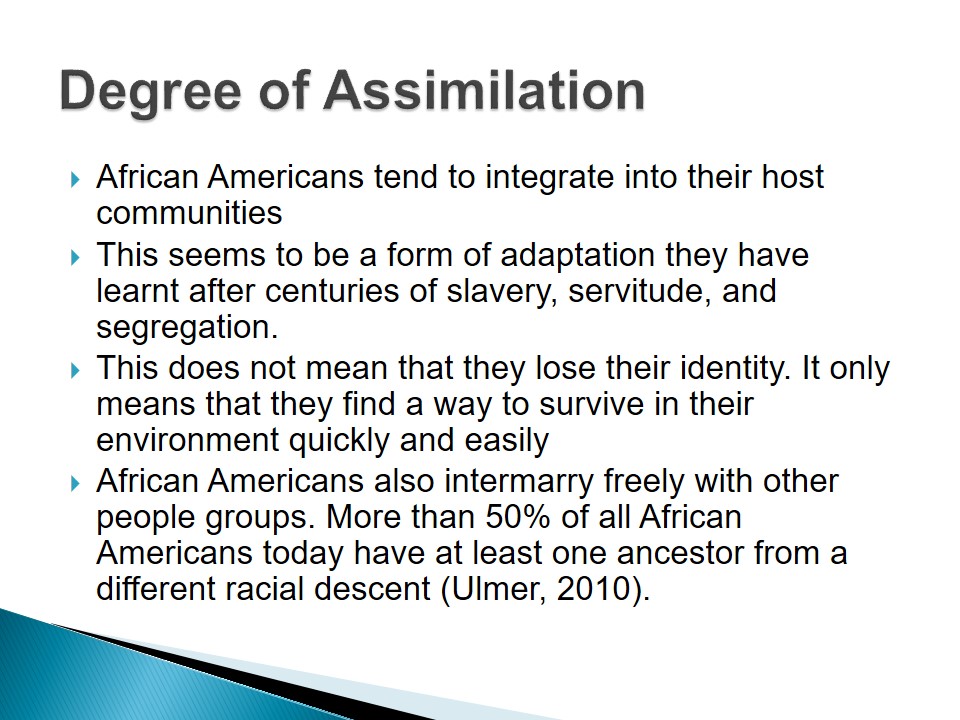
Heath Behaviors and Practices
- African Americans have the lowest life expectancy in America (Niles, 2010).
- Researchers attribute this to lower education levels, and a higher poverty incidence (Scott, 2005).
- African Americans also have the highest infant and maternal mortality within America (Niles, 2010).
- African Americans also rely more on traditional medicine and faith than other Americans (Jones, 2008).
- African Americans have access to a disproportionately low level of healthcare benefits. They also benefit the least from health insurance.
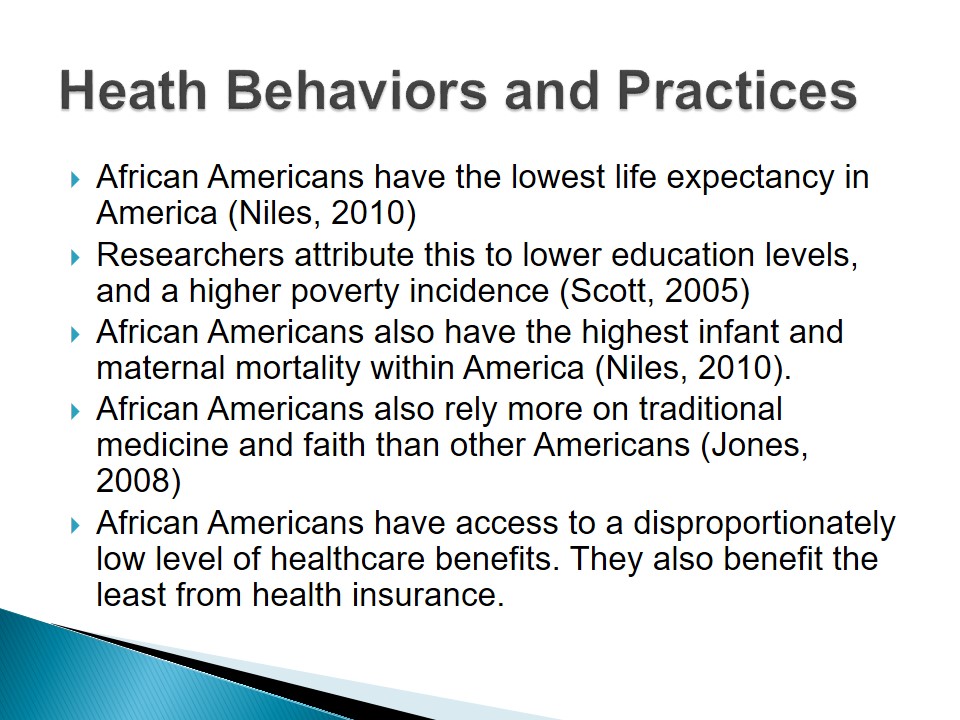
References
Jones, C. (2008). Study Shows Blacks don’t Share Similar Views of World. Web.
Laster, K. (2001). The Law as Culture. Perth: Federation Press.
Niles, N. J. (2010). Basics of the U.S. Healthcare System. Sudbury, MA: Jones & Bartlett Learning.
Scott, J. H. (2005). The African American Culture. The African American Leadership Forum (pp. 1-9). White Plains, NY: Pace University.
Ulmer, C. (2010). Future Directions for the National Healthcare Quality and Disparities Reports. Washington DC: National Academies Press.